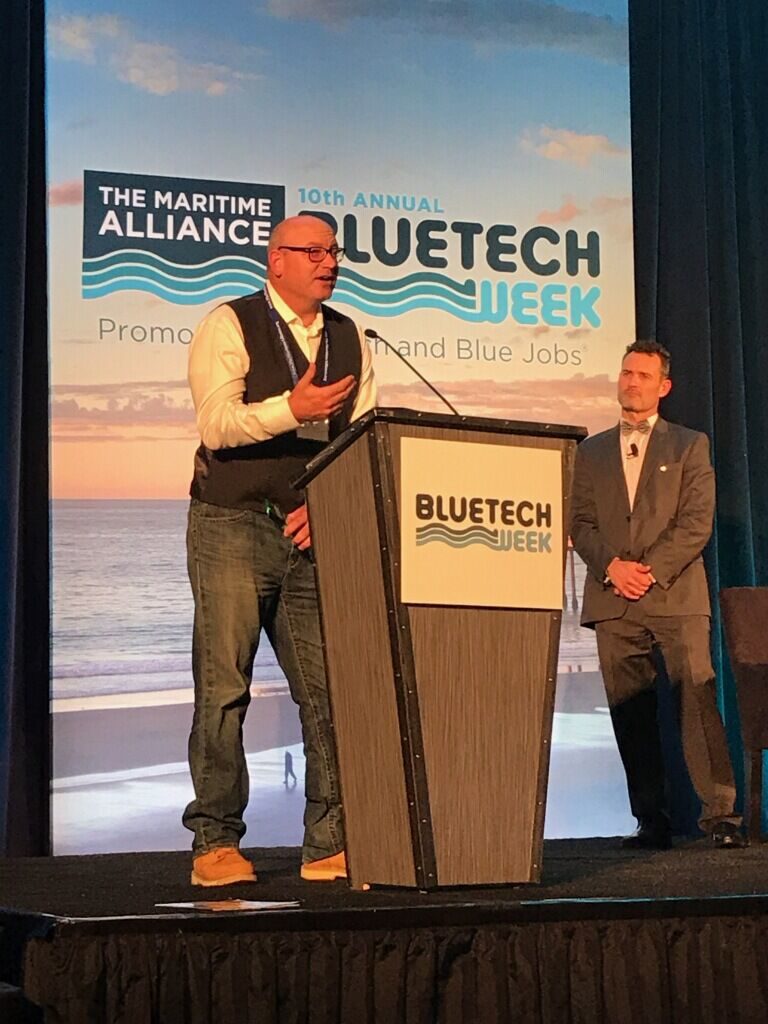CAMARILLO — CSU Channel Islands (CSUCI) Environmental Science & Resource Management Chair Sean Anderson, Ph.D., is the winner of the 2018 Marine Science Teaching Award, which is presented by The Maritime Alliance.
“It was totally out of the blue and a very kind acknowledgement of the work I’ve dedicated my life to,” Anderson said. “It was humbling and very much appreciated.”
No sooner had he recently accepted his award at the 10th annual BlueTech Gala Dinner & Award Ceremony in San Diego that the Hill and Woolsey fires broke out. Within days, he and his students and technicians got back to work, taking what samples they could to help determine the long-term effects of the fires on Southern California.
“Our students are prepared when they graduate because we embed them in monitoring of unfolding incidents like the Thomas fire, monitoring oil spills and so forth,” Anderson said. “We measure what is actually going on around them so we can get them on the right path for a job in environmental science or a related field.”
Anderson’s “boots on the ground” teaching style is part of what earned him the award, which is given to a select number of individuals and organizations each year for their work in the coastal and marine industries, otherwise known as the Blue Economy.
When the Refugio oil spill happened in 2015, CSUCI student researchers were the first scientists on the scene, documenting ecological impact and gathering oil and sand samples from the beach. When the Thomas fire broke out last year, the students were on the blackened hillsides measuring soil and recording damage to wildlife and plants within days of the onset of the burn. And when the Hill and Woolsey fires started recently, they immediately started taking air samples and, as soon as initial road closures were lifted and areas became safe, they began documenting impacts within burn areas.
Blue Economy jobs can be anything from a marine biologist to a wastewater treatment plant technician. The Marine Alliance is a non-profit organization that seeks to define and promote this “Blue Tech” segment of industry, which brings in at least $14 billion each year.
“The Marine Alliance is trying to bring together industry with academia and the government,” Anderson explained. “These groups are really promoting Blue Tech, which describes a huge array of jobs from longshoremen to Ph.D.s building robots.”
Anderson’s classes and the entire Environmental Science & Resource Management program allows students to travel to fishing ports, offshore oil and gas sites, marine research centers and commercial piers to get firsthand experience with the industries affected by government policies.
Under Anderson’s guidance, CSUCI students work with underwater remotely-controlled vehicles (ROVs) and aerial drones, to name just a few of the tools used to more accurately explore our oceans and coastlines and discover new ways to keep them healthy for generations to come.
To learn more about CSUCI’s Environmental Science & Resource Management program, visit:
https://www.csuci.edu/academics/esrm.htm.
About California State University Channel Islands: CSU Channels Islands is reimagining higher education for a new generation and era. We are an innovative higher education institution that enables students to succeed and thrive, serves as an engine for social and economic vitality and provides the intellectual resources necessary for a thriving democracy. With more than 7,000 students, 1,200 employees and 16,000 alumni, CSUCI is designated by the U.S. Department of Education as a Hispanic-Serving Institution and is committed to serving students of all backgrounds from the region and beyond. Our strong academic programs focus on business, sciences, liberal studies, teaching credentials, and innovative master’s degrees. Connect with and learn more by visiting CSUCI’s Social Media.

